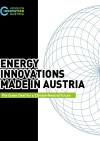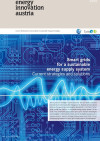Suchergebnisse für "Factsheet: Energietechnologien gestalten, die für alle sinnvoll und nutzbar sind"
Economical Utilisation of residues from slaughtering and meat processing
By utilising fresh raw materials, the process of producing meat and bone meal can be avoided and products of higher quality may be obtained.
Semi-manual dismantling of small electric and electronic equipment
Improving the tecnology of manual dismantling processes of small electric and electronical appliances, used in social enterprises. Via software modules, developed do analise dismantling processes, from dismantling-factories to dismantling-parks.
Green facades with moss plants
Development of moss-covered facade panels by selecting and testing of appropriate moss species, new water storage and adhesive substratum, Materials of the support panels and technical construction details, for year-round green, sustainable, maintenance friendly, affordable building facades
Investigations on the Fundamental Suitability of Sprayed-on and Plaster-covered hygrothermic active Cellulose-Compact-Soundabsorber

Development of a new kind of spray-on and plastered noise absorber on the basis of cellulose from recycled paper. The absorber system preferably attenuates the low-frequency range, that can usually only be controlled with rather complex systems, and can also be used where conventional absorbers could cause problems due to impermissible water vapour condensation.
Symbiose-4-I&C - Optimal decentralized hybrid storage technologies among different energy systems -4-Industry and Commerce
The project Symbiose-4-I&C analysed the coupling of existing energy networks/-carriers, established on centralized energy network nodes or directly next to a consumer (households, industry and commerce) and the benefits of applying decentralized storage technologies. The optimal position, dimension and the right storage and conversion technology and an optimal energy wide operation of larger consumer groups were estimated for an urban model region.
i3 - SustainableFoodManagement
It is the aim of the project to develop a model of sustainability management for a company of the meat processing industry. The management model includes strategy development, goal setting, evaluation of achievements of goals and support to the operationalisation of the model in form of an IT-system. The model is designed and implemented for the production processes of the company in year 1, and in the further years for the whole company and the value chain of the company.
Construction of a local biogas grid in Güssing - Technical and economical concept for the implementation
Decentralized energy supply systems are a very important contribution for the use of regional potentials as these technical solutions are always fitted to specific conditions. Local biogas grids should complement already existing technologies and be analyzed accordingly.
Development of a comprehensive procedure within the design of high-speed-cutting processes in consideration of environmental protection and occupational health aspects
In the metal working industry high-speed-cutting (HSC) in connection with minimal quantity cooling-lubrication promises a high potential for saving process materials. On the one hand costs of purchase and disposal of metal working fluids (MWF) decrease, on the other hand the reduction of dermal diseases and emissions of MWF-dusts are expected.
Energy Innovations made in Austria - The Green Deal for a Climate-Neutral Future

This brochure presents the latest findings in energy research in Austria with examples from cities of tomorrow, decarbonisation of industry, digital transformation and green hydrogen.
Herausgeber: Bundesministerium für Klimaschutz, Umwelt, Energie, Mobilität, Innovation und Technologie (BMK), Klima- und Energiefonds, June 2020
Englisch, 36 Seiten
Downloads zur Publikation
Smart grids for a sustainable energy supply system

Current strategies and solutions
energy innovation austria
2/2016
Herausgeber: BMVIT und Klima- und Energiefonds
Englisch, 8 Seiten
Downloads zur Publikation
INNANET - Practice-oriented concept for implementation of industrial sustainability-networks
On the basis of conventional and recycling-oriented supply-chains and/or -networks a concept for the implementation of industrial sustainability networks will be developed. Together with a taskforce which needs to be founded a pilot implementation will be prepared.
Edible Seestadt - Green Seestadt - Learning for the Edible City of the Future
"Edible Seestadt" ("Essbare Seestadt") identifies which contributions an edible city provides for a climate-neutral resilient district and how this contribution can be sustainably stabilized and optimized.
digiactiv - digital transformation for more interactivity in MEP-(mechanical, electrical and plumbing-)planning
The aim of the digiactiv project is to improve the interoperability between the different stakeholders in the building construction sector using open and neutral semantic data models. With digital transformation processes, digiactiv helps to increase the quality of planning and the operation of buildings, as well as to minimize the interface risk between various stakeholders.
SC_micro-quarters – Planning and modernisation of smart city quarters with a view to energy optimisation and a high quality of life
The SC_micro-quarters project demonstrates possibilities for urban planning and urban quarter development with a view to creating a path to a low carbon city with a high quality of life and good resilience, while taking into account existing and proposed buildings, infrastructures and uses. The central element is the modelling of urban structures at micro-quarter level.
Update of content and usability for the Manual for Energy Consultants (HfE-New)
The Manual for Energy Consultants had been adapted to present and future needs in energy consulting. The updated manual will preserve the basic concept (buildings with at least close to domestic energy use patterns, up to 1000 m² heated floor area, concentration on refurbishment) and the existing structure: Checklists, data sheets and explanations.
IEA HPP Annex 28: Test procedure and seasonal performance calculation for residential heat pumps
Test procedure and seasonal performance calculation for residential heat pumps with combined space heating and heating of tap water - IEA Heat Pump Program Annex 28
Sustainable Business Planner
Further development of the established management concept business plan to the Sustainable Business Plan. Production, testing and dissemination of the holistic user-oriented IT Tool "Sustainable Business Planner" in the context of an Austrian start-up initiative.
SpeedReg - Prompt quality assurance of the commissioning process of buildings
The focus of the project is on quality assurance within the commissioning process with the aim to speed up and to improve the operational adjustment of newly constructed or comprehensively renovated buildings. The fragmented know-how which is hardly accessible for the relevant target groups will be consolidated and elaborated in the form of a practice guideline which will be directly applicable in commissioning processes in practice. In this way the project contributes to the development of a common, well-established standard for quality assurance within the commissioning of buildings.
Technical status of ventilation systems for buildings

Evaluation of existing ventilation systems in Austria considering technical quality and practicability.
Sustainability Management System - scorecard-based construction of an operative sustainability management
Implementation of a scorecard-based sustainability management system in four enterprises; adaptation of a web-based software for sustainability management and reporting; preparation of the manual "Sustainability Managing Systems" on the basis of the OIN guidelines "Reporting about Sustainability".
